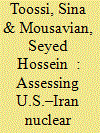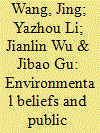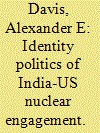| Srl | Item |
| 1 |
ID:
156275


|
|
|
| 2 |
ID:
171429


|
|
|
|
|
| Summary/Abstract |
Nuclear energy facility development in China has become controversial amid widespread environmental concerns. The present study examines how environmental beliefs influence public acceptance of nuclear energy in the context of China. In the current study, we test the mediation effect of nuclear engagement and test place attachment as a moderator based on cognitive-affective processing system theory. Our data have been obtained from an online survey, using a sample consisting of 516 individuals with experience in the public participation activities in Chinese nuclear power plant projects. The empirical results show that environmental beliefs are positively and significantly correlated to public acceptance of nuclear energy through the individuals’ nuclear engagement. Place attachment negatively and significantly moderates the direct impact of environmental beliefs on nuclear engagement. In the meantime, the mediating effect of nuclear engagement is weaker when place attachment is high. Significant practical implications are provided in our study for the Chinese governmental authorities.
|
|
|
|
|
|
|
|
|
|
|
|
|
|
|
|
| 3 |
ID:
130876


|
|
|
|
|
| Publication |
2014.
|
| Summary/Abstract |
Although its precise definition is contested, the concept of the 'Anglosphere' has grown in political discourse in the past decade. Anglospherist authors have defined it as a group of states tied together on the basis of shared tradition, laws, liberty and language. And yet they do not discuss India substantively, placing it firmly on the outside of its hierarchy. Others have argued the concept is based in a racialised, Anglo-Saxon identity. In 2005, Manmohan Singh surprised some domestic observers by emphasising India's positive connections to the 'English-speaking world' while speaking at Oxford University. Shortly after, India announced negotiations on a civil nuclear agreement with the US, leading to similar agreements with Canada, the UK and Australia. This article uses the contemporary India-US nuclear engagement to investigate India's position in relation to the ideational space of the Anglosphere and how this shapes India-Anglosphere relations. It is argued that India's postcolonial scepticism towards this space combined with the inherent anglocentrism in Anglosphere identity discourse limits India-Anglosphere relations while simultaneously animating nuclear engagement.
|
|
|
|
|
|
|
|
|
|
|
|
|
|
|
|